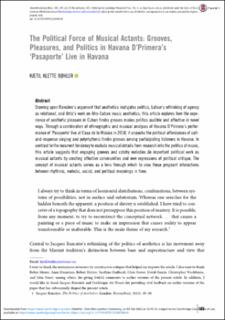The Political Force of Musical Actants: Grooves, Pleasures, and Politics in Havana D'Primera's ‘Pasaporte’ Live in Havana
Peer reviewed, Journal article
Published version
Permanent lenke
https://hdl.handle.net/11250/2987058Utgivelsesdato
2021-06Metadata
Vis full innførselSamlinger
Originalversjon
https://doi.org/10.1017/S1478572220000614Sammendrag
Drawing upon Rancière’s argument that aesthetics instigates politics, Latour’s rethinking of agency as relational, and Ortiz’s work on Afro-Cuban music aesthetics, this article explores how the experience of aesthetic pleasure in Cuban timba grooves makes politics audible and affective in novel ways. Through a combination of ethnographic and musical analyses of Havana D’Primera’s performance of ‘Pasaporte’ live at Casa de la Música in 2010, it unpacks the political affordances of call-and-response singing and polyrhythmic timba grooves among participating listeners in Havana. In contrast to the recurrent tendency to exclude musical details from research into the politics of music, this article suggests that engaging grooves and catchy melodies do important political work as musical actants by creating affective communities and new expressions of political critique. The concept of musical actants serves as a lens through which to view these pregnant interactions between rhythmic, melodic, social, and political meanings in time.

